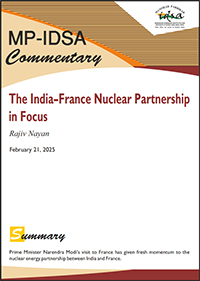The India–France Nuclear Partnership in Focus
- February 21, 2025 |
- IDSA Comments
From 10 to 11 February 2025, Prime Minister Narendra Modi visited France, where he co-chaired the multilateral Artificial Intelligence Action Summit. His visit also included bilateral discussions with French President Emmanuel Macron, resulting in a joint statement, several Memorandums of Understanding (MoUs), new agreements and amendments to existing ones.One key area of cooperation was the nuclear sector, reinforcing the long-standing India–France partnership in nuclear energy, science and technology. During Modi’s visit, both nations reaffirmed their commitment to past agreements while introducing new initiatives in the field. This renewed emphasis on nuclear collaboration highlights the enduring significance of France’s nuclear capabilities and India’s rising stature as a nuclear power and geopolitical player. The joint statement and other outcome documents reflect the vast potential for future cooperation in nuclear technology.A notable outcome was the ‘Declaration of Intent on the Establishment of a Partnership on Advanced Modular Reactors and Small Modular Reactors’. [i] This aligns with India’s growing focus on modular reactors, as also reflected in the India–US joint statement[ii] following Modi’s visit to the United States.The importance of modular reactors in India’s nuclear strategy is evident in recent budgetary allocations. The Union Budget 2025–26 introduced a Nuclear Energy Mission dedicated to the research and development of Small Modular Reactors, with Rs 20,000 crore earmarked for the initiative. The goal is to develop at least five domestically designed and operational Small Modular Reactors by 2033, underscoring India’s commitment to advancing its nuclear capabilities.[iii]
In the 2024–25 budget presented after the 2024 Parliamentary elections, the government announced the Research and Development (R&D) of Bharat Small Modular Reactors, proposed to be developed with private sector involvement. The finance minister in her budget speech stated:
Nuclear energy is expected to form a very significant part of the energy mix for Viksit Bharat. Towards that pursuit, our government will partner with the private sector for (1) setting up Bharat Small Reactors, (2) research & development of Bharat Small Modular Reactor, and (3) research & development of newer technologies for nuclear energy. The R&D funding announced in the interim budget will be made available for this sector.[iv]
India views nuclear energy as a key component of its long-term energy transition strategy and is committed to achieving 100 GW of nuclear power capacity by 2047. Nuclear energy is expected to play a crucial role in the Developed India@2047 vision. The India–France joint statement also emphasised nuclear energy’s role in transitioning to a low-carbon economy.
In recent years, nuclear energy has gained global support for its environmental benefits, despite concerns following the Fukushima incident. This shift has been particularly evident over the last two decades. Additionally, the recent energy crisis triggered by geopolitical disruptions has reinforced India’s commitment to nuclear energy. Unlike several Asian and European countries, India has maintained a consistent approach, avoiding knee-jerk reactions to nuclear incidents such as Fukushima.
India is actively pursuing the indigenous development of nuclear energy, involving both government and private sector participation. The Nuclear Power Corporation of India Limited operates several nuclear power plants, including the 700 MW Kakrapar power station. Significant progress is also being made in the country’s fast breeder reactor programme. However, many public and private sector companies have yet to fully realise their potential in the nuclear energy sector. Through the Prime Minister’s visit to France, India appears to be seeking greater global engagement in its ambitious nuclear energy initiatives.
Globally, France holds a prominent position in nuclear science and technology. The World Nuclear Association highlights France’s strong nuclear profile,[v] noting that approximately 70 per cent of its electricity comes from nuclear power—a result of decades-long energy security policies. A policy introduced in 2014 aimed to reduce nuclear’s share of electricity generation to 50 per cent by 2025, but this target was postponed to 2035 in 2019 and eventually abandoned in 2023.
In February 2022, France announced plans to construct six new nuclear reactors, with the possibility of adding eight more. As the world’s largest net exporter of electricity, France benefits from low production costs, generating over €3 billion annually. Additionally, approximately 17 per cent of its electricity comes from recycled nuclear fuel. This strong nuclear foundation explains why Prime Minister Modi has chosen France as a key partner in advancing and strengthening India’s nuclear energy sector. The joint statement also recollected ‘cooperation on the peaceful uses of nuclear energy, notably in relation with the Jaitapur Nuclear Power Plant Project’.[vi]
Furthermore, both countries have committed to renewing and implementing the MoU between India’s Department of Atomic Energy and France’s Commissariat à l’Énergie Atomique et aux Énergies Alternatives (CEA) for cooperation with the Global Centre for Nuclear Energy Partnership (GCNEP). Since its establishment, GCNEP has played a crucial role in capacity building, collaborating with multiple countries and the International Atomic Energy Agency. Similarly, France’s Institute for Nuclear Science and Technology has developed various programmes for human resource development, including doctoral and post-doctoral degrees, further enhancing expertise in the nuclear field.
Notably, after India secured clean exemptions under the Nuclear Suppliers Group (NSG) guidelines in 2008, France was the first country India engaged with for future nuclear collaborations. Both the countries continued to work on the 2008 Agreement on the Development of Peaceful Uses of Nuclear Energy between India and France as well as the January 2016 roadmap of cooperation. In 2018, Nuclear Power Corporation of India Ltd (NPCIL) had inked an Industrial Way Forward Agreement with the Électricité de France S. A. in March 2018. However, due to certain unforeseen developments such as the bankruptcy of Areva (the French company) and domestic protests against the Jaitapur site, the partnership did not progress as expected.
The Ukrainian conflict has once again highlighted the relevance of nuclear power as one of the reliable sources of energy and electricity. The French expertise in the nuclear field is well respected in India. The scientific communities of both the countries have been interacting with each other. Prime Minister Modi’s visit could mark the beginning of a new era in India–France nuclear cooperation.
Views expressed are of the author and do not necessarily reflect the views of the Manohar Parrikar IDSA or of the Government of India.
[i] “List of Outcomes: Visit of the Prime Minister to France (10-12 February 2025)”, Ministry of External Affairs, Government of India, 12 February 2025.
[ii] “India – France Joint Statement on the Visit of Shri Narendra Modi, Hon’ble Prime Minister of India to France (10-12 February 2025)”, Ministry of External Affairs, Government of India, 12 February 2025.
[iii] “Nuclear Power in Union Budget 2025-26”, Press Information Bureau, Department of Atomic Energy, Government of India, 3 February 2025.
[iv] “Budget 2024-2025—Speech of Nirmala Sitharaman Minister of Finance”, Government of India, 23 July 2024.
[v] “Nuclear Power in France”, World Nuclear Association, 4 February 2025.
[vi] “India – France Joint Statement on the Visit of Shri Narendra Modi, Hon’ble Prime Minister of India to France (10-12 February 2025)”, no. 2.






